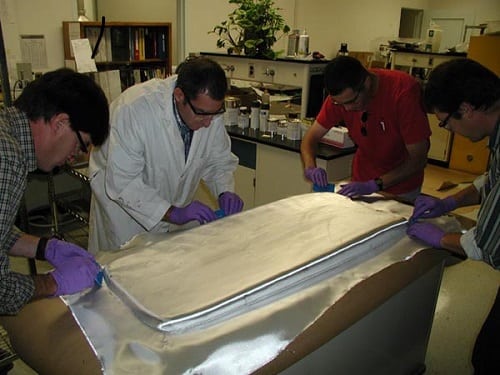If you have ever wondered who creates the materials used in technology and consumer products of all kinds, then a career as a materials engineer might be for you. Materials science and engineering is the study of developing and testing materials and how those materials can be used to solve problems. Within the field of materials engineering, professionals may specialize by the type of material they work with, holding job titles like ceramic engineer, composites engineer, metallurgical engineer, plastics engineer and semiconductor processing engineer, according to the United States Bureau of Labor Statistics. Like all engineers, materials engineers need to take plenty of classes in math, science and engineering design.
 IMAGE SOURCE: Wikimedia Commons, public domain
IMAGE SOURCE: Wikimedia Commons, public domain
Math and Science for Materials Engineering
You may wonder how important math and basic science courses really are for engineering majors. Can’t you just learn what you need to know from your engineering classes? The Accreditation Board for Engineering and Technology (ABET) considers college-level math and science classes to be so integral to the success of aspiring engineers that it requires all accredited engineering programs to include at least one year – or 32 college credits – of math and science courses.
For materials engineering students, math courses in calculus and especially multivariate calculus are important. Some materials engineering programs might require specific classes in linear algebra and differential equations, as well.
Studies in the natural and physical sciences are particularly crucial for prospective materials engineers, who use chemical, physical and biological processes to develop and study materials. Chemistry coursework might include studies in general chemistry, organic chemistry, physical chemistry, crystal chemistry and structures and chemistry for engineers. An introductory biology course, like essential biology, can be valuable, though not all materials engineering programs will require it. Students may have to take courses in foundations of physics at levels of increasing difficulty, as well as coursework in physics for engineers.
To graduate from ABET-accredited materials engineering programs, students need to be able to apply advanced concepts from each of these disciplines of science.
The Engineering Component of Materials Science Programs
Once you complete enough math, science and general education courses to really dive into your engineering science and design coursework, you will see firsthand how interesting and complex the field of materials science and engineering can be. Students of ABET-accredited degree programs must be proficient in applying science and math concepts to all four of the major elements – properties, structure, processing and performance – that make up the discipline of materials engineering. Developing these skills requires studies in general engineering topics as well as classes specific to materials science and engineering.
The general engineering courses in a materials engineering program might include introductory courses in computer aided design and drafting, linear and dynamic engineering systems, thermodynamics, computation, foundation of materials and evaluation of experimental data. Among the most important studies for engineering students of all disciplines is engineering design laboratory coursework, which is often taken over the course of two or more semesters.
Materials science engineering courses include required classes that expose students to the fundamentals of all kinds of materials as well as elective courses. Students can use their technical or free electives to pursue a track or specialization in the type of material that most interests them.
All materials engineering students are likely to study topics such as the mechanical behavior of materials, kinetics of materials, advanced materials, biomedical materials, thermodynamics of materials, mechanical behavior of solids, defects in solids, case studies in materials and electronic and photonic properties of materials. Regardless of their area of emphasis, students should also take foundational courses in all types of materials engineering, including classes on processing ceramics, polymers and metallic materials.
Materials engineering students can customize their degree with concentrations. Some popular concentrations within the field of materials science and engineering include polymers, biomaterials, nanomaterials, packaging materials and energy conversion and storage. The specializations you choose will determine in part what classes you take as an undergraduate student. A student pursuing a concentration in nanomaterials, for example, might study nanoscience and nanotechnology as well as biological applications of nanomaterials and the structural, mechanical and chemical properties of nanomaterials. On the other hand, students focusing on energy conversion and storage may take classes in solar cell design, power electronics and sustainable energy.
Students gain experience applying math and science to engineering design work through field work throughout the curriculum, a senior design project, an internship or a cooperative program.
Additional Resources
What Classes Will I Have to Take for a Degree in Engineering?
What Are the Benefits of Pursuing a Degree in Engineering?


